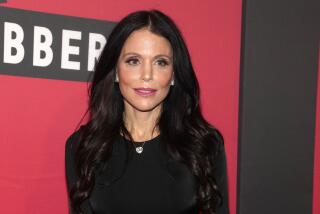To Increase Diversity, NAACP May Encourage TV Network Regulation
- Share via
NEW ORLEANS — NAACP President Kweisi Mfume said he would consider pressing for government regulation to increase diversity at the major television networks and plans to broaden the scope of his efforts to include additional segments of the television industry, such as talent agencies.
Speaking at the National Assn. of Television Program Executives convention here Wednesday, Mfume said the groups lobbying for greater racial diversity in TV could seek “some kind of content-neutral rule” similar to the Children’s Television Act, which mandates that broadcasters provide three hours per week of educational children’s programming.
Such an approach could be tied, he said, to public-service requirements related to the advent of digital television, which will potentially allow broadcasters to split their signals into multiple channels--some of which could set aside time, theoretically, as a showcase for minority talent.
Mfume conceded after his presentation that such legislation was a longshot given the prevailing deregulatory mood in Congress, but he said it is “something that continues to loom as an option if there are further impasses.”
As for expanding the National Assn. for the Advancement of Colored People campaign to target talent agencies, he said, “If there’s a problem with the networks, there’s also a problem with agencies. . . . It’s not enough to point the finger at the networks. This is a multifaceted industry.”
The NAACP has already scored a significant coup by getting NBC and ABC into signing initiatives designed to promote diversity in front of and behind the camera. A similar agreement with Fox will likely be formalized next week, with CBS to follow.
Questioned by ABC News’ Connie Chung, Mfume acknowledged he chose this particular battle in part because it was a headline-grabbing issue, clearly winnable in the court of public opinion and good publicity for the organization. He then added, “It’s [also] the right thing to do.”
Given similar complaints in the past that quickly fizzled--among them a boycott threat by the Rev. Jesse Jackson--Mfume said it was easy for the networks to assume that “given the history of this, they’re going to go away.” Still, he stressed the concessions made are only a first step--as he put it, “a beginning, not an end.”
*
The same theme was seized upon in a subsequent panel titled “Diversity in Prime Time.” Jacqueline Kong, executive creative director of Asian-American Media Development, insisted any victories won thus far could wind up being hollow without a vice president of diversity at each network, reporting to the chief executive, to ensure the goals are implemented.
“Otherwise, this could be just lip service,” she said.
Fox is expected to adopt such a provision, though the other networks have not committed to that specific demand--a source of initial friction between the NAACP and the Latino, Asian and Native American groups that joined with it to lobby the networks.
Kong added that broadcasters must demonstrate they are taking the issue seriously, asking how many network executives attending the NATPE conference were in the audience for the diversity panel. After a pause, she said, “I don’t see one hand.”
More to Read
The biggest entertainment stories
Get our big stories about Hollywood, film, television, music, arts, culture and more right in your inbox as soon as they publish.
You may occasionally receive promotional content from the Los Angeles Times.










